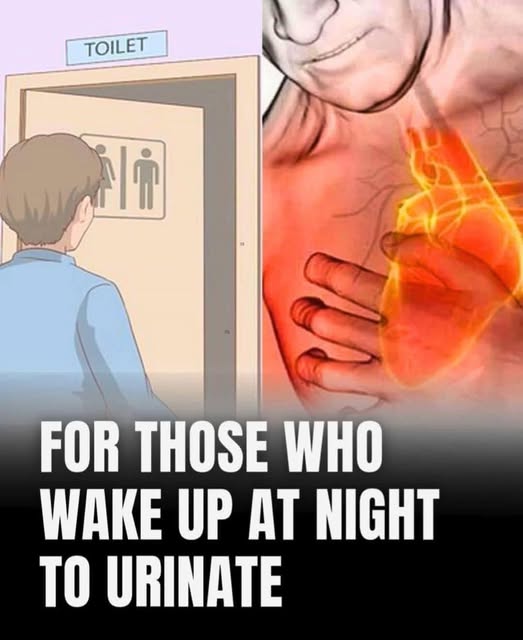
You’re sound asleep — until you feel it:
The familiar urge to pee.
You get up.
Go back to bed.
And two hours later… it happens again.
If you’re waking up multiple times a night to urinate, you’re not alone.
But what you may not realize is that this common habit — called nocturia — isn’t just a bathroom issue.
Emerging research suggests it could be an early warning sign of heart problems, including heart failure.
Let’s explore the surprising link between nighttime urination and heart health — and when it’s time to talk to your doctor.
What Is Nocturia?
Nocturia is the need to wake up two or more times per night to urinate.
It affects:
Over 50% of adults over 50
Up to 80% of people over 80
While often dismissed as a normal part of aging or a prostate issue, nocturia can be a red flag for underlying conditions — including cardiovascular disease.
❤️ The Heart-Bladder Connection: Why Heart Failure Causes Nighttime Urination
It may seem strange — what does your heart have to do with your bladder?
But here’s how it works:
1. Fluid Redistribution
During the day, people with heart failure often have swelling in the legs and feet (edema) due to poor circulation
When you lie down at night, gravity shifts that fluid from your legs back into your bloodstream
Your kidneys respond by producing more urine to remove the excess fluid
This process is called nocturnal polyuria — a key driver of nocturia in heart patients.
2. Reduced Cardiac Output
A weakened heart pumps less efficiently
The body compensates by activating hormones that affect kidney function and fluid balance
This can increase nighttime urine production
3. Sleep Apnea & Heart Strain
Obstructive sleep apnea (common in heart patients) causes low oxygen and stress on the heart
This can trigger the release of atrial natriuretic peptide (ANP) — a hormone that increases urine output at night
A 2021 study in The Journal of Clinical Sleep Medicine found that treating sleep apnea reduced nocturia in patients with heart failure.
What the Research Says
A 2020 study in Circulation: Heart Failure found that frequent nocturia (≥2 times/night) was strongly linked to heart failure with preserved ejection fraction (HFpEF) — a common form in older adults
Another study in European Heart Journal showed that waking up to pee 3+ times per night was associated with a 30–40% higher risk of heart disease
The American Heart Association now recognizes nocturia as a potential early marker of cardiovascular strain
For many, nocturia appears years before other heart failure symptoms like shortness of breath or fatigue.
When to Be Concerned
Occasional nighttime urination? Normal.
But see a doctor if you have:
Waking up 2+ times nightly, regularly
Possible heart, kidney, or metabolic issue
Swelling in legs or ankles
Fluid retention — a sign of heart strain
Shortness of breath when lying flat
Could be
orthopnea
— common in heart failure
Fatigue, weakness, or palpitations
Other signs of poor heart function
Especially concerning if you have high blood pressure, diabetes, or a family history of heart disease.
✅ What You Can Do
1. Track Your Symptoms
Keep a bladder diary:
How many times you pee at night
Fluid intake timing
Any swelling or fatigue
2. Adjust Fluid Timing
Limit fluids 2–3 hours before bed
Avoid alcohol and caffeine in the evening — both are diuretics
3. Elevate Your Legs in the Evening
Helps reduce fluid buildup in legs during the day
Less fluid to redistribute at night
4. Talk to Your Doctor
Mention your nighttime bathroom trips — don’t brush it off
Ask for:
Heart and kidney function tests
Blood pressure and BNP (heart stress hormone) levels
Sleep apnea screening
❌ Common Misconceptions
“It’s just my prostate”
While common in men, nocturia affects women too — and heart links exist regardless of gender
“It’s normal aging”
Frequent urination isn’t something to just accept — it may signal a treatable condition
“Only serious heart patients are affected”
Early signs can appear
years before diagnosis
Final Thoughts
Waking up to use the bathroom might seem like a minor annoyance — but your body could be sending a silent message about your heart.
And the sooner you listen, the better your chances of preventing serious complications.
So if you’re making frequent midnight bathroom runs, don’t just blame your bladder.
Think about your heart.
Because sometimes, the earliest warning signs come not with pain — but with a quiet trip down the hallway.